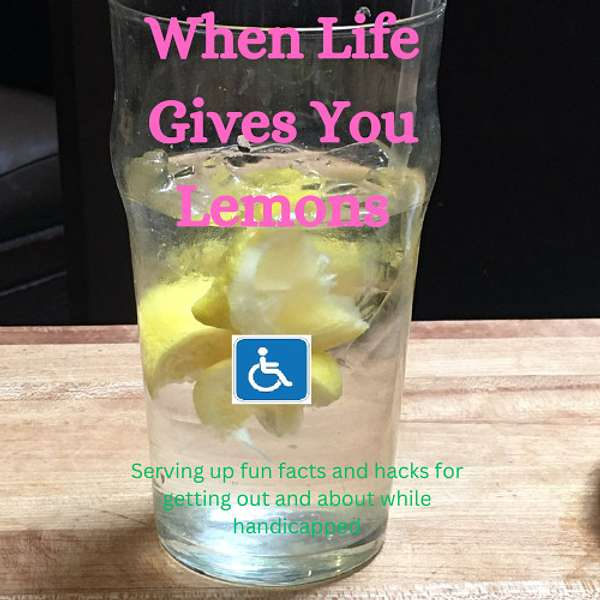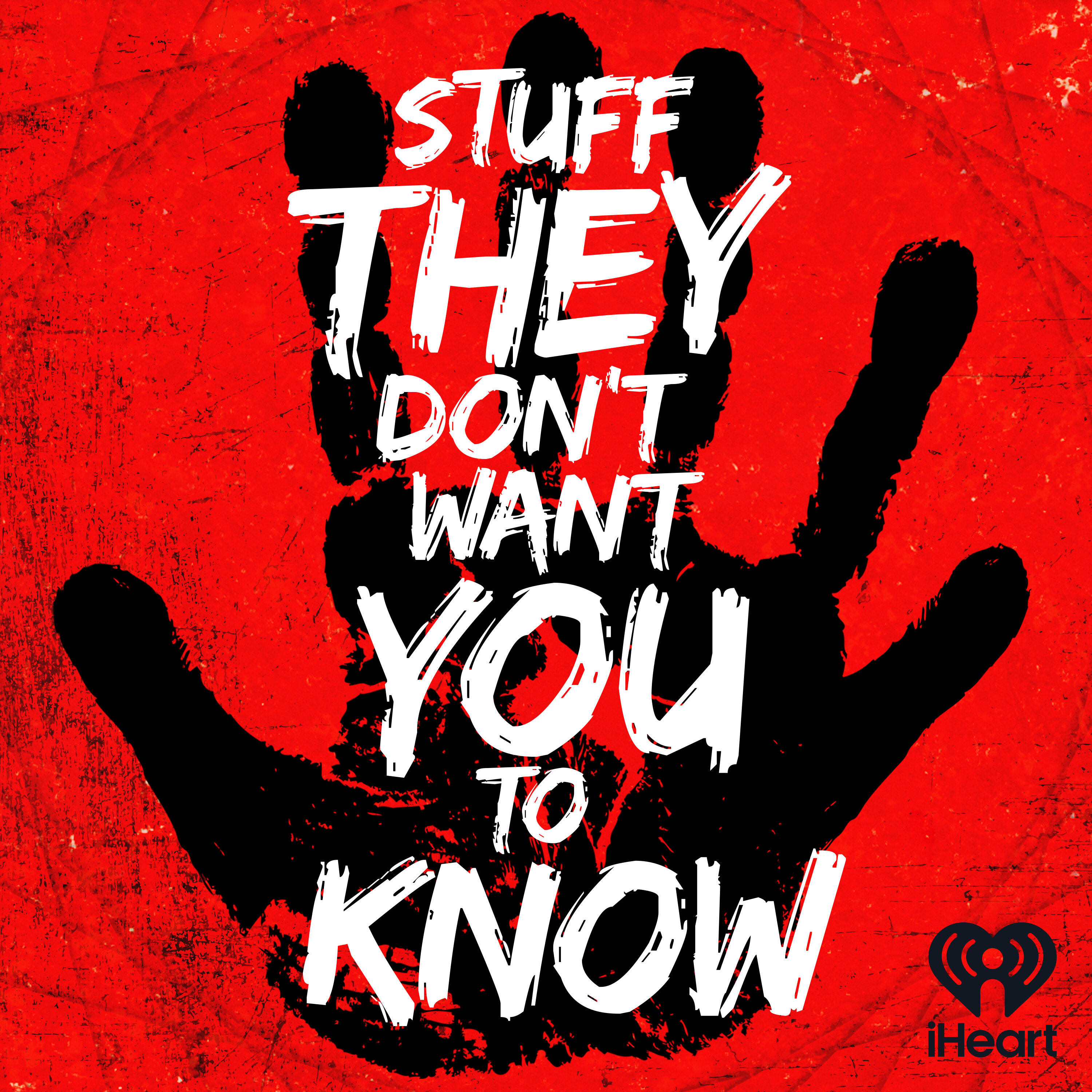
When Life Gives You Lemons
We do a bit of Research into handicapped travel issues and provide some solutions. Mobility, Hearing, Sight, Mental issues included. so far our episodes have included some information on Ataxia, Cerebral Palsy, Deafness, Dancing Sickness, Gulf War Syndrome, Long Covid and Wheelchairs. We are both Disability Advocates and realize there are too many diseases and conditions to cover and try to discuss the most common problems disabled people face and spread some awareness of disabled issues non-disabled people are unaware of.
CORRECTION
On a Previous episode I described how to enter our End Of Season contest. Step 1 click on the support our show link. Step 1 we require a one time payment (This has changed during our season) of $3. Step 3 (get you back to a one time payment) click on the $3 Subscription button. The following business day cancel the subscription (if you do it same day your bank may start thinking FRAUD. Step 4 Your done. Thanks for entering and "may the odds be forever in your favor",
When Life Gives You Lemons
Autism Spectrum: Beyond the Labels
What does it really mean to be on the autism spectrum? Beyond stereotypes and misconceptions, autism spectrum disorder (ASD) represents a fascinating variation in how human brains develop and function.
We dive deep into understanding autism as a neurodevelopmental condition that affects how people interact, communicate, and experience the world around them. The spectrum nature of autism means presentations range widely - from individuals with subtle social differences to those facing significant challenges in daily functioning. You'll learn why many autistic people find comfort in routine and predictability, how sensory sensitivities can impact everyday experiences, and the unique cognitive strengths many autistic individuals possess.
The episode explores practical support strategies that make a real difference, from clear communication techniques to sensory-friendly environmental adjustments. We break down effective educational approaches for autistic students, including structured classroom environments, visual supports, and strength-based learning that leverages special interests. Understanding proper diagnosis processes helps identify the specific support each person needs to thrive.
Our conversation emphasizes that autism represents a different - not lesser - way of experiencing and interacting with the world. By promoting acceptance, education, and appropriate supports, we can create environments where autistic individuals flourish on their own terms. Join us on this journey toward greater understanding and share your thoughts on our Facebook page about autism or other disability topics you'd like us to cover in future episodes.
Welcome to our podcast. When Life Gives you Limits, I'm Kevin.
Palmi:And I'm Palmi. We consider ourselves disability advocates and intend to spotlight some disability issues and things we find interesting that we frequently encounter when we're out and about. Also some history on disability that we find interesting. History on disability that we find interesting.
Kevin:Well, hello folks, we're here for another episode of what Life Gives you Lemons, the podcast.
Palmi:Welcome, welcome, welcome.
Kevin:So, Palmi, what are we talking about today?
Palmi:Our topic is autism and or autism spectrum disorder, asd.
Kevin:Do you know anything about it? The only thing I know about it is I know there are varying degrees of autism, from very affected to pretty much what you would deem as normal. Just they don't display the disorder, if you will, yeah.
Palmi:Autism.
Kevin:But they display it.
Palmi:Isn't that called being on the spectrum?
Kevin:Yeah, that's why they call it spectrum, versus, like with cancer, diagnosis stage one, stage two, stage three.
Palmi:I think we're going to talk a lot about what the how it, the side effects and how it's the behavior is, but they really don't know a lot about it scientifically.
Kevin:They don't really know a lot about it and, as we just mentioned, it's to varying degrees. Some people are very affected by autism. Some have autism but are supposedly frail, but they're supposedly for all appearances. You just did not give you the feedback. They're going through extra steps in their mind.
Palmi:Okay, so let's get right to it. Um, autism or autism spectrums, uh, disorder A, s, d is a neurodevelopmental condition that affects people, affects how people interact, communicate and experience the world. It's called a spectrum because it presents in wide ranges of ways, from subtle social differences to significant challenges in daily life.
Kevin:There you go. That's what I was trying to say. Go to the information. People with autism may often struggle with understanding social cues, maintaining conversations or expressing emotions. These are often expressed in non-typical ways or even in typical ways Non-typical ways or even a typical ways, again, depending where on the spectrum you are but you know it's often running through their minds if they're not seeing it or displaying it.
Palmi:Another key aspect is repetitive behavior or routines. Many autistic individuals find comfort in routine and may engage in repetitive movements or intensive focus on specific interests.
Kevin:Sensitivities Some experience heightened or reduced sensitivity to sounds, lights, textures or other sensory inputs.
Palmi:Lights- textures or other sensory inputs, decisive strength or challenges. Autism is not just about difficulties. Many autistic individuals have unique talents in areas of memory, problem solving and creativity.
Kevin:Autism is lifelong meaning it doesn't go away with any sort of treatment or with age. Support and understanding can help autistic individuals thrive. Oftentimes an autistic individual. If they're able to cope with the sensitivity to stimuli and actually don't diverge, neurologically speaking, with the ways to learn or overcome any difficulties in learning or communication, they cannot lead normal-seeming lives.
Palmi:And early intervention and tailored support makes a significant difference in the development and quality of life. I know when Rose was born premature and they worked on sensitivity sensory sensitivity they would make her put her hands in. Premature children have that type of stuff too. They'd make her put her hands in sand and water and soap all different kinds of sensory things that would get her used to, so her brain would connect to that, and I think that's probably a lot of what they do too. You know I know our family has quite a few premature children, very premature all the way to. You know not. Our daughter was the least premature, at six months, believe it or not, and she was three pounds. The rest of them were like less than a pound in some cases and they all went through that sensory sensitivity program in order to develop their brain. Supporting individuals with autism involves understanding their unique needs and strengths, and here are some effective strategies.
Kevin:Yeah, when it comes to communication, you want to use clear and concise language, obviously not. Don't put the guy up there that speaks abnormally Is what that boils down to in my case.
Palmi:Well, no, they just need direct communications without ambiguity. Is that the word Ambiguity?
Kevin:Ambiguity yeah.
Palmi:So that they know exactly what they're supposed to do.
Kevin:so that they know exactly what they're supposed to do. Oftentimes I've found out that people do not understand what I'm saying. They only get certain words. So when I say do not do this, all they hear is this If we're in the kind of well, you said, do this. No, I said do not do this?
Palmi:Visual supports tools like social stories, schedules and picture-based communications can be incredibly helpful, so can alternative communications?
Kevin:Some autistic university individuals use AAC, augmentative and alternative communication devices or apps to express themselves.
Palmi:Is that like on the computer?
Kevin:It can be, can be, it can be, uh like, yeah, I'm sure you may have seen either documentaries sitcoms or whatever with stephen hogging, oh yeah and uh. He's basically a computer to uh. Oh, like we are looking into the size of voice, right?
Palmi:like we are looking for into you, so you could use it, right, yeah?
Kevin:And they also. Of course, you can use a high generator if you use the internet to generate a voice, as long as you have text input to it.
Palmi:Yeah, we're talking about children at this age. They might not have that knowledge.
Kevin:Yeah, I'm going to guess it would. In a couple years Somebody will be able to come up with apps that are pretty much tied to those IEIs and they can just use their phone to form a text and then have that voice speak for them if needed.
Palmi:Yeah, makes sense. Establish predictable routines. Consistency helps reduce anxiety and increases comfort in the daily life. Prepare for changes, give advance notice and use visual schedules to ease transitions. I use that on you, okay.
Kevin:Strength-based support encourages passions and interests. Many autistic individuals excel in areas they're interested in and other areas they kind of underproduce because they're not that interested in it.
Palmi:Okay, we skipped sensory considerations. So adjust environments, minimize sensory overloads, reduce the bright lights. Loud, loud noises help autistic individuals feel more comfortable. Provide sensory-friendly tools like noise-canceling headphones. Weighted blankets and fidget toys can offer comfort.
Kevin:Yeah, I've seen a couple autistic individuals who blog on the internet. They always have some sort of device to keep their hands fitted yeah, basically one gal I was watching has like a it looks like a twizzler from a distance, you know, just a red kind of thick piece of rope. I guess. She just twirls it around.
Palmi:It's a comfort toy.
Kevin:yeah, yeah it just gives her hands and fingers something to do, while her, you know, it makes her feel more secure in her environment.
Palmi:Well, that leads right into the. Promote the self-advocation, promote autistic individuals into understanding and express their needs is empowering. And then the next one is the social. You want to start that one.
Kevin:Social inclusion, acceptance, foster inclusive environments, whether it be school, work or social settings. Embracing neurodiversity leads to better support. We also have educating others. I have educating others. You have to raise awareness and understanding about the individual. It helps create a more accepting community.
Palmi:That's kind of what we're doing here. Support autistic students in school requires structured and inclusive and individual approaches. There's many effective strategies. We're going to list a few of the classroom environments.
Kevin:Help students focus and understand expectations. Visual supports, picture, schedules and labels. Reinforce their independence in task competition. Sensory-friendly adjustments adjustments reducing bright lights, loud noises and providing quiet zones that can help manage sensory sensitivities.
Palmi:And, as we talked before, routine and predictability. Structured schedules using visuals, schedules with symbols or picture cards help students anticipate transitions and reduce anxiety. Calm down areas. Designated spots with sensor tools allow students to self-regulate when overwhelmed.
Kevin:Behavioral and Learning Support. Applied Behavior Analysis, or ABA, is a structural approach that reinforces positive behaviors and helps educators tailor interventions. Prompting and reinforcing techniques encouraged desired behaviors and learning collaboration between teachers, aides and specialists, and are adapted to individual needs.
Palmi:And, as we stated before, every autistic child or individual is different, so these have to be wide-ranging and used based on the individual needs Right. So inclusive classroom strategies is to visually support and structured teaching Schools that have successfully implemented visual schedules, social stories and structured teaching methods like T-E-A-C-C-H to help autistic students navigate their day. Strength-based learning. Some schools focus on leveraging students' interests to enhance engagement. For example, a student passionate about maps might use GPS-based activities to develop math and geographic skills Activities to Develop Math and Geographic Skills, and I'm going to put a story in here for everybody.
Kevin:I was actually. Once I was going through these research notes I was thinking, oh, this would be a great time to get one of our special ed teachers and do an interview about what sort of things they typically see in students in this area, Uh-huh, and how they cope with overcoming the problems they got. But hey, it's summer. No school. It's hard to find a teacher.
Palmi:They disappear, don't they? Yeah, so we're on social and behavioral support. So peer mentoring programs. Students have introduced peer buddy systems where neurotypical students support autistic classmates in social interactions and group activities, fostering inclusion. No, I'm saying that wrong Sensory-friendly classrooms Adjust like quiet zones, noise-canceling headphones and flexible seating can help students regulate sensory input and focus better.
Kevin:Yeah, I'm going to have to take out all those centrals. You say so. People don't think we're trying to teach kids the wrong thing.
Palmi:This is rated PG right.
Kevin:Yes, Specialized support services, speech and occupational therapy integration schools that integrate their speech therapy with their occupational therapy and behavioral interventions develop routines that cause improvements in communication and self-regulation. Social skills are programs that teach functional communication and social interaction through structured activities that have helped autistic students build confidence and relationships.
Palmi:So testing for autism typically involves a multi-step evaluation process that combines behavioral observation, developmental history and standardized assessment. Here's how it usually works. They do a developmental scanning. This is often the first step, especially for children scanning this is often the first step, especially for children. Pediatricians usually may use brief questionnaires during routine checkups to flag any sign of the developmental delays.
Kevin:Comprehensive diagnosis, diagnostic evaluation. If concerns arise, a more in-depth assessment is done by specialists such as developmental pediatricians, child psychologists or neurologists. This includes interviews with caretakers. It's like the autism diagnostic interview revised, or ADI, that we spoke of before, but with a dash R for revised Direct observation of behavior communication, again such as the ADI, but in this time they call it an ADOS for Autism Diagnostic Observation Schedule.
Kevin:And of course they have to have standardized tests. Every category of education has standardized tests. Those are to assess cognitive, language and motor skills and motor skills.
Palmi:So the DSM-5 criteria is. Clinicians use the criteria for the Diagnostic and Mental Statistical Manual of Disorder, so that is the DSM-5 to determine if someone meets the diagnostic threshold for autism spectrum disorder. This includes persistent challenges in social communications and restricted repetitive behaviors.
Kevin:Additional testing is necessary in some cases. We're talking genetic testing, neurological exams or sensory processing assessments. Those can be recommended to a lot of other conditions or have a better understanding of the individual's needs at the individual's needs.
Palmi:ASD typically appears in early childhood, often before age three, and includes what were once considered separate conditions like Asperger's syndrome and childhood disorder. Common traits include difficulty with social interaction and communications, repetitive behaviors and intense focus on specific interests. Sensory sensitivity, ie to sound, light and textures. So that gives us a little more understanding of what autism is. That will lead us into our next episode, which we have one of our friends, our neighbor, her son is autistic, and that she'd be able to go into more detail of specifically what has helped him in the past and what his schooling has been All right.
Kevin:So before we send off, we have a few housekeeping items to talk about. Number one we're going to end this season in November. I'll get you that date during the next episode, please. You can support us easily by just word of mouth, telling somebody about this program. We'd like to hear some feedback from people on our facebook page or via email or via fan mail. It's all up to you. We've given you several ways to discuss items with us. We'd like to hear you, but as far as topics you'd like to hear, we've only had one, so one request like that this year that we'll get into on later episodes for the rusty slackers. Let us know what it is you want to hear about.
Palmi:Hey you, you really increased your Facebook page. I saw there's quite a few members now.
Kevin:Yeah, I've been trying these past couple weeks to really work to develop that aspect and hopefully get a couple conversations going. What I'm going to do is, if you read the description for this episode off the website wwwwhenlifegivesyoulovingsnet, it will give you a direct link to that Facebook page. That way you don't have to go through my page to get to it.
Palmi:And I saw on there that Maria, one of our past interviewers, was on there. She raced in the Corn de Tour, de Tour, de Corn, de Tour de Corn or whatever that is. Did you see her pictures on there? I did, yeah, I picked it up there yesterday, whatever that is. Um, they did you see that?
Kevin:her pictures on there. I did yeah, I'm very proud of her yesterday, but I didn't have a whole lot of details so I didn't have a whole lot of contact. Yeah, but her pictures up there yay, maria.
Palmi:and now maria started a new Facebook page, so please join her Facebook page too. She talks about disability issues also.
Kevin:Okay, folks, that's about all we have for this week.
Palmi:Let's get going before we get blown away by the leaf blower.
Kevin:Yes, the guy out in our yard. I have no idea who this guy is or why, but he's blowing our lawn apparently tried to just blow everything away like a tornado all right, bye for now see you later. Folks, till next episode, take those lemons and make your own love and date.
Podcasts we love
Check out these other fine podcasts recommended by us, not an algorithm.

When Life Gives You Lemons
Kevin & Palmi Henry
Stuff They Don't Want You To Know
iHeartPodcasts
Stuff Mom Never Told You
iHeartPodcasts
Stuff You Missed in History Class
iHeartPodcasts
Planet Money
NPR
Ridiculous History
iHeartPodcasts
The Way I Heard It with Mike Rowe
The Way I Heard It with Mike Rowe




